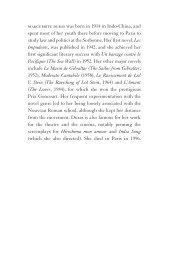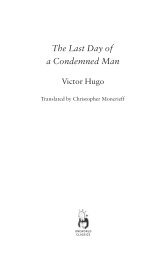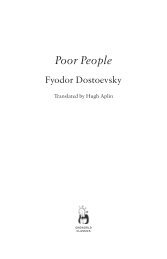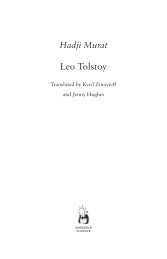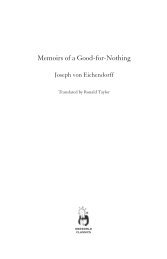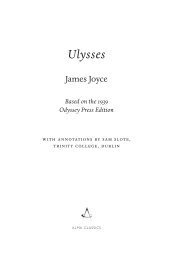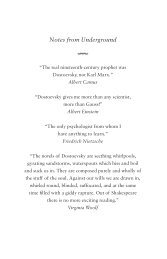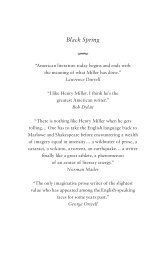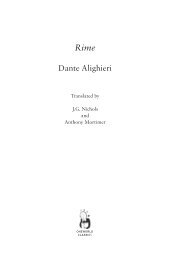Winter Notes on Summer Impressions - Alma Classics
Winter Notes on Summer Impressions - Alma Classics
Winter Notes on Summer Impressions - Alma Classics
You also want an ePaper? Increase the reach of your titles
YUMPU automatically turns print PDFs into web optimized ePapers that Google loves.
winter notes <strong>on</strong> summer impressi<strong>on</strong>s<br />
His analysis of Western Europe, first outlined in the <strong>Summer</strong><br />
Impressi<strong>on</strong>s and thereafter relentlessly pursued through the pages of<br />
most of his books and particularly of his Diary of a Writer, presents<br />
a strange amalgam of Slavophile prejudice and Fourierist ideals, of<br />
religious utopianism and historical materialism, and of traditi<strong>on</strong>alist<br />
c<strong>on</strong>cepts expressed in terms of the Communist Manifesto. His earlier<br />
enthusiasm for Fourier – the cause, indeed, of his sojourn in the<br />
“House of the Dead” – and his acute awareness of those social and<br />
ec<strong>on</strong>omic forces that lie at the bottom of our cultural edifice, lead him<br />
to give certain historical events an interpretati<strong>on</strong> rendered familiar to<br />
us by Marxist writings. Thus he regards the French Revoluti<strong>on</strong> as a<br />
mere sham, benefiting no <strong>on</strong>e but the middle classes, the bourgeoisie,<br />
whom it enabled to obtain a firm grip <strong>on</strong> the proletariat in order to<br />
exploit it. The hollowness of the Revoluti<strong>on</strong>, he says significantly<br />
enough in his Diary of a Writer, was exposed by the executi<strong>on</strong> of<br />
Babeuf, the apostle of early communism.<br />
This attitude colours the whole of his approach to France, with<br />
which a large part of the book is c<strong>on</strong>cerned. Like Marx, he refuses<br />
to see in the Revoluti<strong>on</strong>’s, and later the Republic’s, slogan – Liberty,<br />
Equality, Fraternity – anything but a piece of bourgeois hypocrisy,<br />
a gigantic bluff; he c<strong>on</strong>siders, like Marx, that there can be no real<br />
freedom in Western Europe without ec<strong>on</strong>omic power; like Marx, he<br />
believes that proletarians are bound to unite – “form their own heap”<br />
– in defence of their own interests without the fraudulent pretence<br />
of speaking for humanity as a whole; he has the true Marxist (and<br />
Slavophile) c<strong>on</strong>tempt for Western liberalism and for all forms of<br />
parliamentary government, and, like Marx again, sees in the whole<br />
network of European social policy and behaviour nothing but<br />
the bourgeoisie’s frantic attempt to retain the status quo. But the<br />
proletariat, he says, is knocking at the door and <strong>on</strong>e day will force it<br />
open. Repudiated by the bourgeoisie and kept away from this world’s<br />
goods, it is ready to join in the class struggle and eager to repudiate<br />
the repudiators.<br />
It is obviously a theme that haunted Dostoevsky, for, having dealt<br />
with it in some detail in his <strong>Summer</strong> Impressi<strong>on</strong>s, he returned to it<br />
and repeated it with exasperating frequency in his Diary of a Writer<br />
many years later. No doubt his insistence <strong>on</strong> the dire fate awaiting the<br />
Western capitalist world, though often expressed in quasi-Marxist<br />
x




